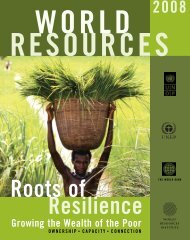jp8589 WRI.qxd - World Resources Institute
jp8589 WRI.qxd - World Resources Institute
jp8589 WRI.qxd - World Resources Institute
Create successful ePaper yourself
Turn your PDF publications into a flip-book with our unique Google optimized e-Paper software.
CHAPTER 3<br />
THE ROLE OF GOVERNANCE<br />
Fair Permitting and Licensing<br />
A key element of access to economic justice for the poor is the<br />
ability to obtain permits and licenses for small business enterprises<br />
via processes that are transparent, fair, and efficient. The<br />
state of affairs in many developing countries departs considerably<br />
from this norm. In Zimbabwe, for instance, red tape and expensive<br />
licensing fees constrain the ability of poor communities to<br />
launch small businesses based on wildlife tourism or other<br />
products and services. Registration of a tourist company in<br />
Zimbabwe takes more than a year and costs about US$14,000 to<br />
obtain needed certificates and guarantees (Narayan 2002:55).<br />
In Lima, Peru, registering a small garment workshop<br />
employing a single owner-operator takes on average 289 days<br />
and costs in excess of US$1,200, or more than 30 times the<br />
monthly minimum wage. In Indonesia, the official license fees<br />
for registering a small business are about US$400, but the<br />
actual costs often are typically triple that amount (Narayan<br />
2002:54-55). (See Figure 3.6.)<br />
Fortunately, some state and local governments are starting<br />
to make it easier for small entrepreneurs to secure their rights to<br />
operate. In Bali, one municipality introduced “one-stop shops”<br />
for business licenses and permits. This has not only helped<br />
businesses obtain licenses more efficiently but has also<br />
augmented government tax revenues by 75 percent. In India the<br />
government of the state of Gujarat removed the requirement<br />
that gum collectors—virtually all of them poor women—must<br />
sell gum at artificially low prices to a handful of governmentselected<br />
buyers (Narayan 2002:56).<br />
As the numerous examples cited above show, progress in<br />
empowering the poor in their rights to information, participation,<br />
and justice can be made. Such progress is central to<br />
giving the poor the political and business tools to take advantage<br />
of their nature-based assets and to participate in rural<br />
commerce that leads to sustainable economic progress—the<br />
route out of poverty. <br />
77

















